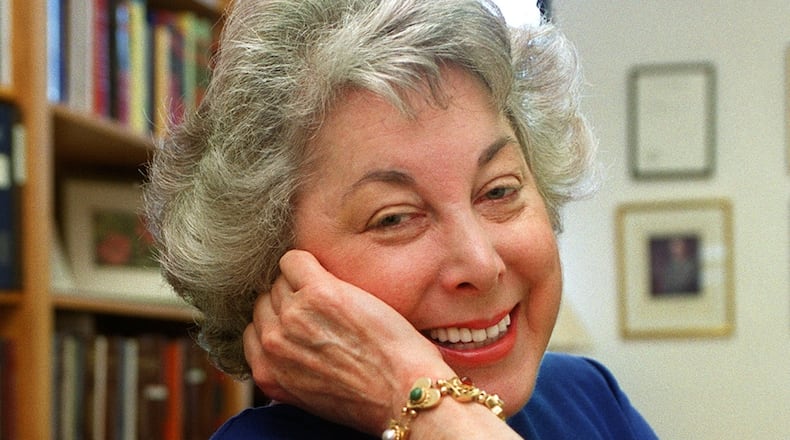Marjorie Fine Knowles, confidante of feminist icons Gloria Steinem and the late Ruth Bader Ginsberg, was known for helping remove sexist provisions from Alabama state law and for setting patriarchy and racism on its heels while making history as the first female law school dean in Georgia.
President Jimmy Carter also appointed Knowles as the first Inspector General of the U.S. Department of Labor.
Mary Radford, the former Marjorie Fine Knowles Professor of Law at Georgia State University, said of meeting Knowles, “It was the first time I was in a room where the most powerful person there wasn’t wearing a coat and tie.”
Known for her love of fashion, jewelry, and gospel music, Knowles confounded sexist stereotypes as she knit elaborate sweaters for friends during meetings where she steamrolled gender and racial oppression.
“Here she was a feminist, but she wasn’t afraid to embrace what was traditionally thought of as softer women skills that were often used to put women in a box,” said longtime friend and Atlanta lawyer Jane Cronin.
“She was a Harvard Law School graduate who had worked in high levels of government. She a was Jewish woman from New York. Frankly, I don’t think Georgia knew what to do with her,” said Roy Sobelson, former associate dean of GSU law school. “She faced the really old-line Georgia mentality — old, white, male, Southern. And she wasn’t going to put up with that.”
Knowles, 82, died in her sleep Sept. 24, while napping at her home in midtown Atlanta. A private graveside funeral was held at Arlington Memorial Park in Sandy Springs. A public memorial service is planned in the future. H.M. Patterson & Son is handling arrangements.
Born in 1939 in Brooklyn, New York, Knowles was the oldest of two daughters of a successful entrepreneur father and a homemaker mother. After high school, she went to Smith College, where she graduated in 1960, and then to Harvard Law School, finishing with honors in 1965. She worked as a district attorney’s criminal prosecutor in New York, and in 1970 became executive director of the Joint Foundation Support (JFS), an umbrella group of foundations that supported liberal causes.
While working for the JFS, she visited the Selma Interreligious Project and met Ralph Knowles, an Alabama civil rights attorney whom she soon married. They honeymooned at the 1972 ACLU Convention in Boulder, after which Marjorie Knowles became the first female faculty at University of Alabama School of Law. There, she oversaw explosive growth in the number of female law students, helped create the university’s women studies major, and taught the first women’s studies course. She wrote an analysis of Alabama statutes affecting women that led to the removal of sexist provisions from the Alabama Code.
Marjorie Knowles left Alabama for Washington, D.C. in 1978 when President Carter appointed her to his cabinet. She rejoined the University of Alabama law faculty in 1980, and was hired in 1986 by Georgia State University as the first woman dean of a Georgia law school. Under her, the law school raised admissions and faculty standards, became accredited by the American Bar Association, enrolled record numbers of female and non-white students, and was named to the list of 100 Best Law Schools in the U.S. by U.S. News and World Report, where it remains through 2021.
“We’re still the youngest law school on that list. Had she not insisted on all she insisted on early on, that would’ve never happened,” Sobelson said.
Marjorie Knowles often talked about her friendship with Steinem, whom she first met in the late 1960s as their lives overlapped professionally. “For someone very much in demand, Gloria still finds the time and energy to be a good friend. At any period of my life when I needed to talk through issues, she’s always been there,” said she in a 1994 interview with the Atlanta Journal-Constitution.
Together, they worked to pass the Equal Rights Amendment, and Knowles helped provide funding for Steinem’s Ms. Magazine, the profits of which supported the feminist movement.
“She went to Harvard Law School at a time when women students there were rare and often accused of taking a man’s place, and she went on to clerk for a district judge and to have important jobs in the federal government at a time when that, too, was rare for women,” Steinem said.
“Though she could have continued this national prominence, she took important teaching positions in Alabama and Georgia, and became a leader for diversity in higher education as well as the life partner of Ralph Knowles, a leader for racial and sexual justice in the law. It is not fair that we have lost her, but if notices like this cause more people to be inspired by her, she will be with us still.”
Survivors include her sister, Carolyn Fine-Clementi of Adelaide, South Australia; sisters-in-law Sue Stacy of Nashville, Tennessee, and Cheryl Knowles of Birmingham, Alabama; and five nieces and nephews.
Memorials may be made to the National Organization for Women (NOW) Foundation, Planned Parenthood Southeast Inc., or Doctors Without Borders.
About the Author
Keep Reading
The Latest
Featured


